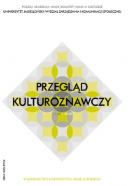CIESZYN CIESZYNIANEK – KULTUROWY OBRAZ MIASTA W LITERACKICH NARRACJACH JEGO MIESZKANEK: EDITH SCHMETTAN-DEMEL I BRONISŁAWY UHER
THE TESCHEN OF TESCHEN WOMEN – CULTURAL IMAGE OF THE CITY IN THE LITERARY NARRATIVES OF ITS INHABITANTS: EDITH SCHMETTAN-DEMEL AND BRONISŁAWA UHER
Author(s): Grażyna KubicaSubject(s): Gender Studies, Cultural Anthropology / Ethnology, Other Christian Denominations
Published by: Wydawnictwo Uniwersytetu Jagiellońskiego
Keywords: urban anthropology; feminist thought; women’s writing; Teschen; Lutheranism in Teschen Silesia;
Summary/Abstract: The capital of the Duchy of Teschen, a medieval city-castle, has always embodied the characteristics of diversity (in terms of ethnicity, religion, class and profession), as well as strong sense of citizenship of its inhabitants. Nowadays, researchers are often no longer able to analyse this phenomenon without falling into nationalist anachronism, usually referring to only one (Polish) tradition, which is in fact quite new, forgetting other ones (Jewish), deliberately omitting them (German), not recognizing their importance (Silesian), or exaggerating their historical significance (Czech). There is also lack of female perspective that would allow a more complete picture of the phenomena. The paper presents and analyses the women’s voice of two literary narratives about Teschen written by its inhabitants: the novel by Edith Schmettan-Demel Die Sieben Kinder des Pastors Kattenschlag [The Seven Children of Pastor Kattenschlag] of 1931 and the memuar written in Silesian Wokół Placu Kościelnego i Kościoła Jezusowego. Spóminki z młodości Bronisławy Uher [Around the Church Square and the Church of Jesus. Bronisława Uher’s Youth Memories], released in 2015. These two voices: of the forgotten Silesian-German novelist and of Silesian-Polish author, significantly testify to the pluralism and the specificity of the urban lifestyle as well as the modernization in the female version. The interpretative framework of this article is the perspective of classical urban sociology and anthropology, as well as feminist thought.
Journal: Przegląd Kulturoznawczy
- Issue Year: 34/2017
- Issue No: 4
- Page Range: 468-490
- Page Count: 23
- Language: Polish

